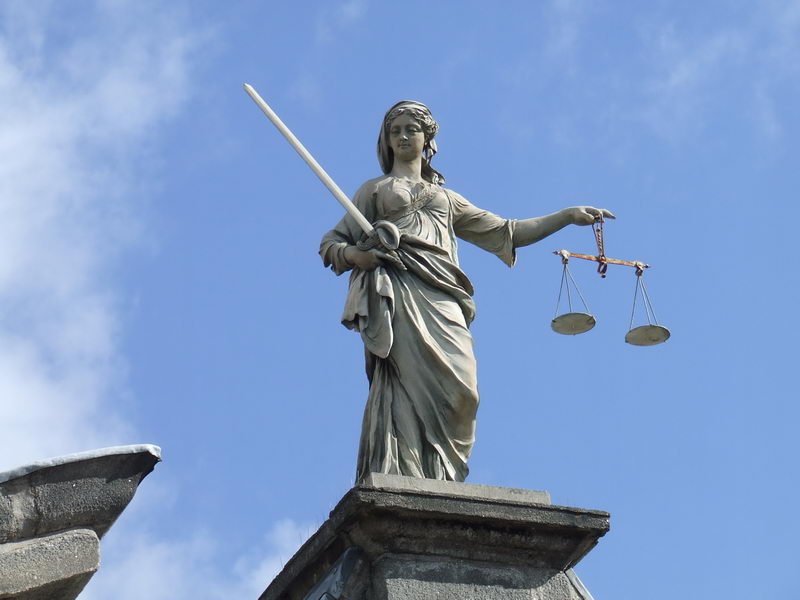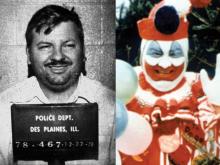The statue of Lady Justice at Dublin Castle
Justice on Trial is a landmark study of prosecutorial misconduct conducted by the Northern California Innocence Project at Santa Clara University School of Law and released in October of 2010.
In 2007, a California Court of Appeal set aside the murder conviction of Mark Sodersten because a Tulare County deputy district attorney had improperly withheld from the defense audiotapes of his interviews with a key witness.
The Appeals court personally listened to the tapes and concluded they contained dramatic evidence pointing to Sodersten’s innocence. Based on this finding, the court vacated his conviction. “This case,” the court declared, “raises the one issue that is the most feared aspect of our system—that an innocent man might be convicted.”
For Sodersten, however, the ruling came too late. He had died in prison six months earlier, after spending 22 years behind bars. The prosecution had sought the death penalty, but the jury sentenced him to life without parole.
The ruling was one of 707 cases of prosecutorial misconduct uncovered in a year-long investigation by the Northern California Innocence Project (NCIP) at Santa Clara University School of Law.
The investigation, made public October 4, 2010 is the most in-depth statewide review of prosecutorial misconduct in the United States.
The investigation reviewed more than 4,000 state and federal appellate rulings, as well as scores of media reports and trial court decisions, covering the period 1997 through 2009, to produce a comprehensive analysis of publicly available cases of prosecutorial misconduct in California.
The NCIP study, conducted by Kathleen Ridolfi, NCIP executive director, and Maurice Possley, a Pulitzer Prize-winning journalist and currently a visiting research fellow at Santa Clara University School of Law, suggested that cases of prosecutorial misconduct averaged one a week over that 13-year period.
But that figure undoubtedly understates the total number of such cases. The 707 were just the cases identified in a review of appellate cases and a handful of others found through media searches and other means.
In another 282 cases examined by the NCIP, the courts did not decide whether prosecutors’ actions were improper, finding that the trials were nonetheless fair.
The report details how prosecutors are rarely disciplined for their misconduct and how the courts fail to report it. The California State Bar rarely investigates such misconduct.
It expanded upon a study of prosecutorial misconduct conducted by Ridolfi after she was appointed to the California Commission on the Fair Administration of Justice in 2004.
The records show the California Bar did investigate the Sodersten case, but failed to take action. Even though Sodersten’s death ordinarily would have ended the case, the Appeals Court took the unusual step of issuing a ruling anyway because of the importance of the issue: “[W]hat happened in this case has such an impact upon the integrity and fairness that are the cornerstones of our criminal justice system that continued public confidence in that system requires us to address the validity of [Sodersten’s] conviction despite the fact we can no longer provide a remedy for petitioner himself.”
The court concluded: “To do otherwise would be a disservice to the legitimate public expectation that judges will enforce justice. It would be a disservice to justice. Most of all, it would be a disservice to [Sodersten] who maintained his innocence despite a system that failed him.”
The prosecutor was never disciplined. Sodersten’s attorney filed a formal complaint with the California State Bar, arguing that the prosecutor “asked a jury to kill a man based on a conviction he perverted.”
In April 2010, the State Bar closed the investigation, because “this office has concluded that we could not prove culpability by clear and convincing evidence” – even though the tapes the prosecutor wrongfully withheld included interviews with a key witness conducted by the prosecutor himself.
The prosecutor, Phillip Cline, has never been held responsible for his actions, and it is virtually certain that he never will. He has absolute immunity from any civil liability for his conduct as a prosecutor. Cline was elected District Attorney for Tulare County in 1992 and remains in that position today.
In the vast majority – 548 of the 707 cases – courts found misconduct but nevertheless upheld the convictions, ruling that the misconduct was harmless. Only in 159 of the 707 cases – about 20 percent – did the courts find that the misconduct was harmful; in these cases they set aside the conviction or sentence, declared a mistrial or barred evidence.
The study shows that those empowered to address the problem – California state and federal courts, prosecutors and the California State Bar – repeatedly fail to take meaningful action. Courts fail to report prosecutorial misconduct (despite having a statutory obligation to do so), prosecutors deny that it occurred, and the California State Bar almost never disciplines it.
Significantly, of the 4,741 public disciplinary actions reported in the California State Bar Journal from January 1997 to September 2009, only 10 involved prosecutors, and only six of these were for conduct in the handling of a criminal case. That means that the State Bar publicly disciplined only one percent of the prosecutors in the 600 cases in which the courts found prosecutorial misconduct and NCIP researchers identified the prosecutor.
Notably, some prosecutors have committed misconduct repeatedly. In the subset of the 707 cases in which NCIP was able to identify the prosecutors involved (600 cases), 67 prosecutors –11.2 percent – committed misconduct in more than one case. Three prosecutors committed misconduct in four cases, and two did so in five.
The report contains a series of recommendations aimed at reducing prosecutorial misconduct. These include:
- development of a course by the California District Attorneys Association, California Public Defenders Association and California Attorneys for Criminal Justice to address ethical issues that commonly arise in criminal cases;
- adoption by District Attorney offices of internal policies that do not tolerate misconduct, including establishing internal reviews of error;
- and adoption by District Attorney offices and law enforcement agencies of written exculpatory evidence policies.
Moreover, the report seeks expansion of judicial reporting to include any finding of “egregious” misconduct, as well as any constitutional violation by a prosecutor or defense attorney, regardless of whether it resulted in modification or reversal of the judgment. The report recommends that judges be required to list attorneys’ full names in opinions finding misconduct.
And the report also recommends that the State Bar expand discipline for prosecutorial misconduct and increase disciplinary transparency.
The Northern California Innocence Project (http://www.ncip.scu.edu/ ) at Santa Clara University School of Law, founded in 2001, operates as a pro bono legal clinical program, where law students, clinical fellows, attorneys, pro bono counsel, and volunteers work to identify and provide legal representation to wrongfully convicted prisoners.
NCIP educates future attorneys, exonerates the innocent, and is dedicated to raising public awareness about the prevalence and causes of wrongful conviction. The project also promotes substantive legislative and policy reform through data-driven research and policy recommendations aimed at ensuring the integrity of our justice system.
To read the excutive summery of the report, please click here (.pdf file).









